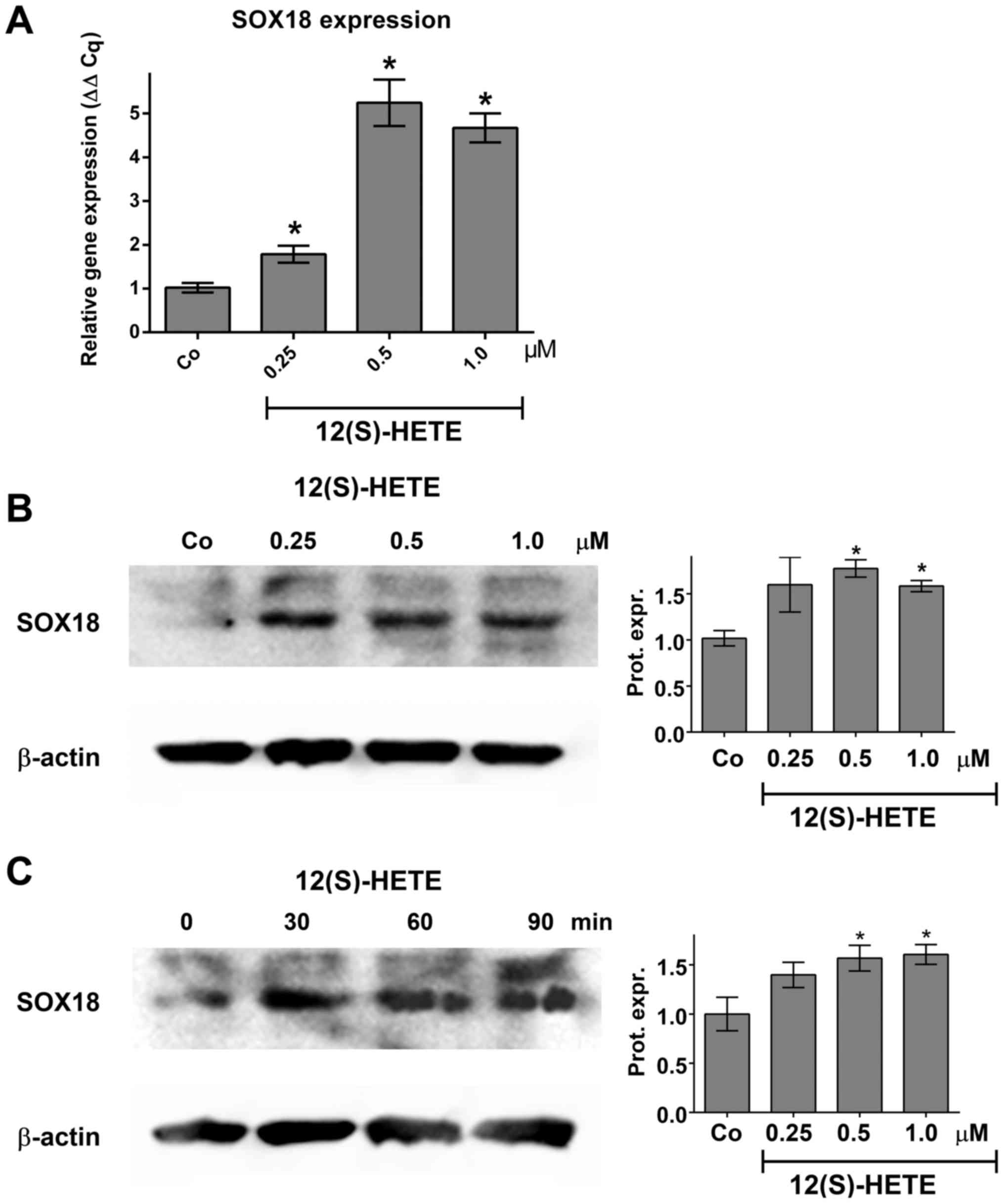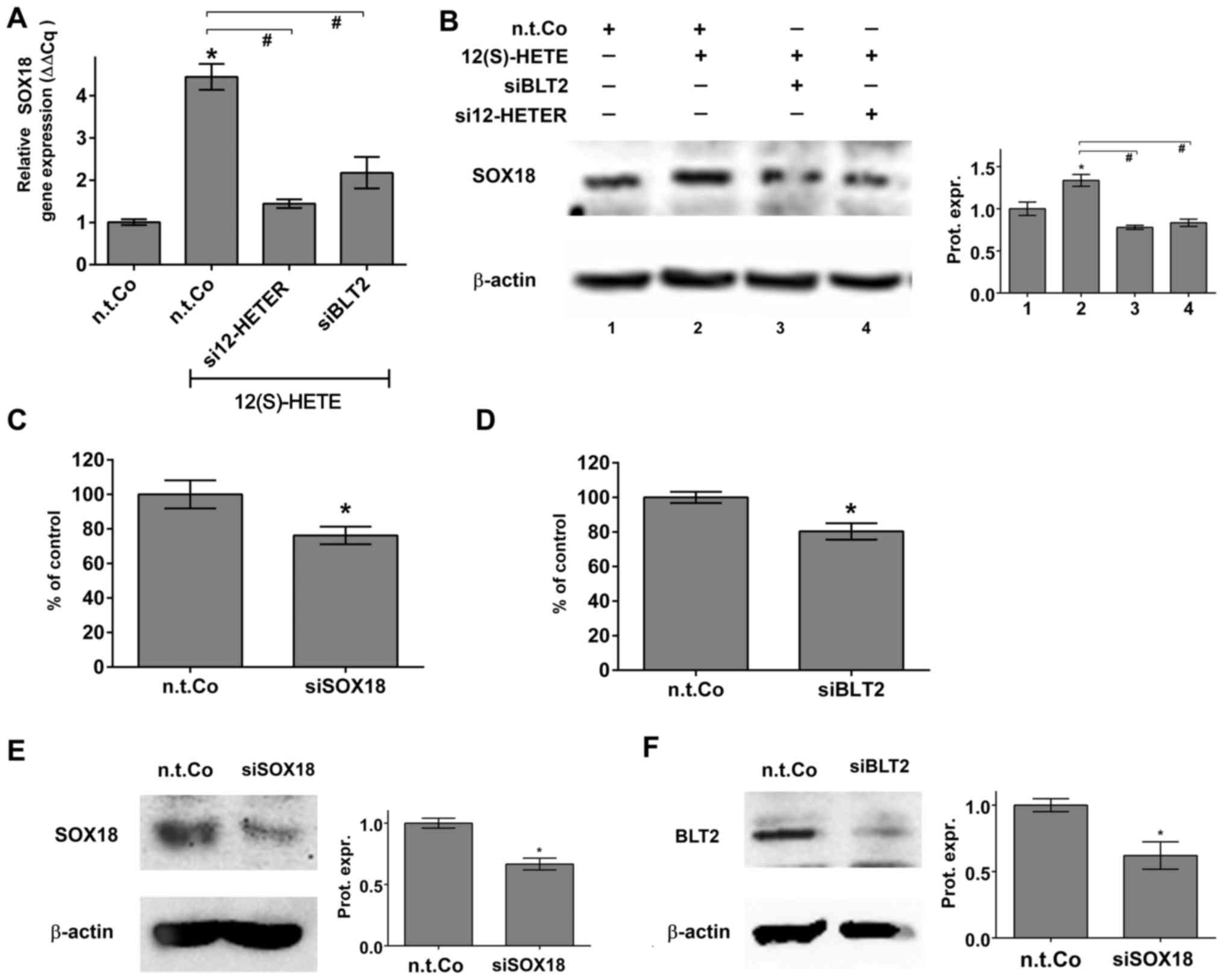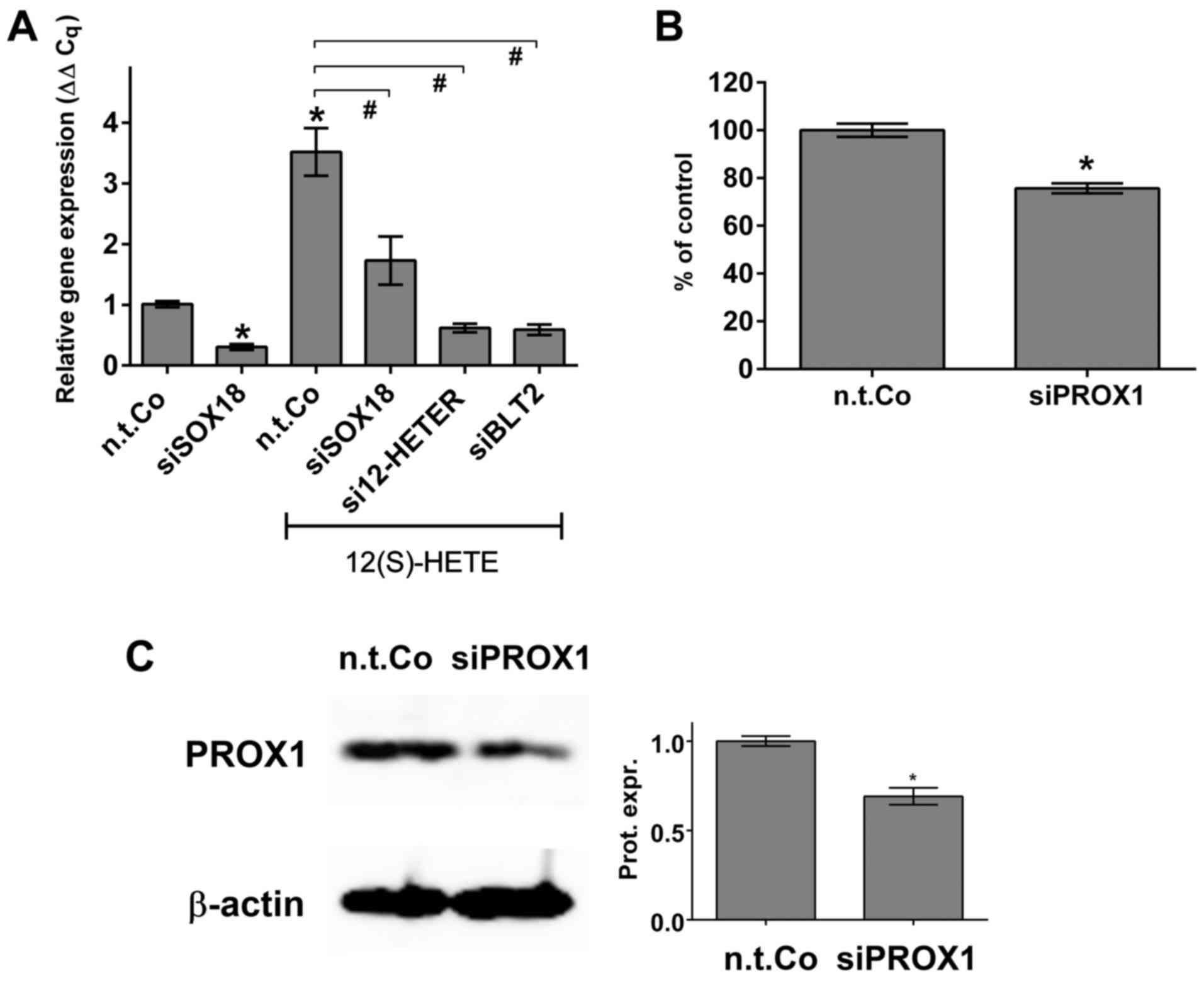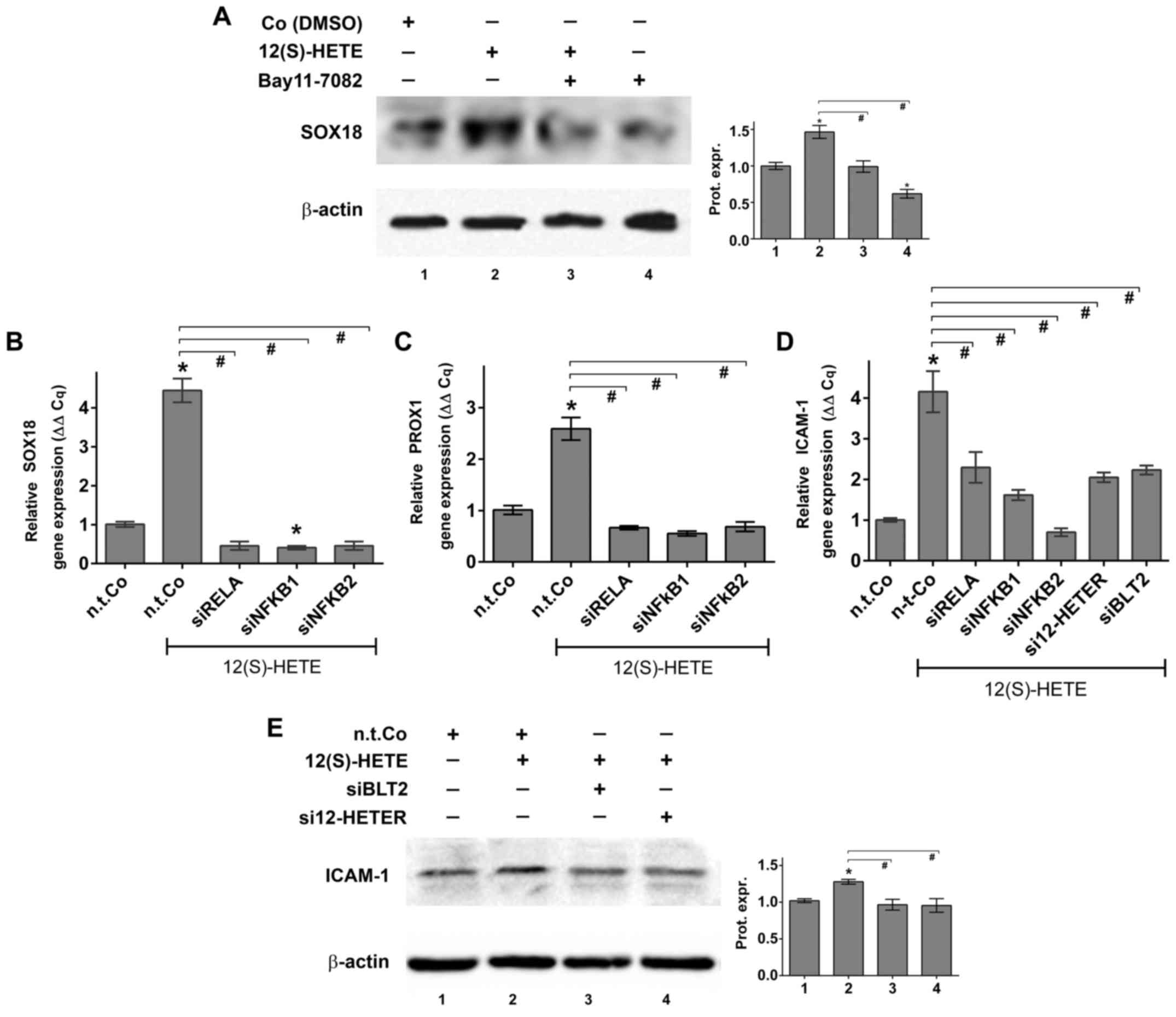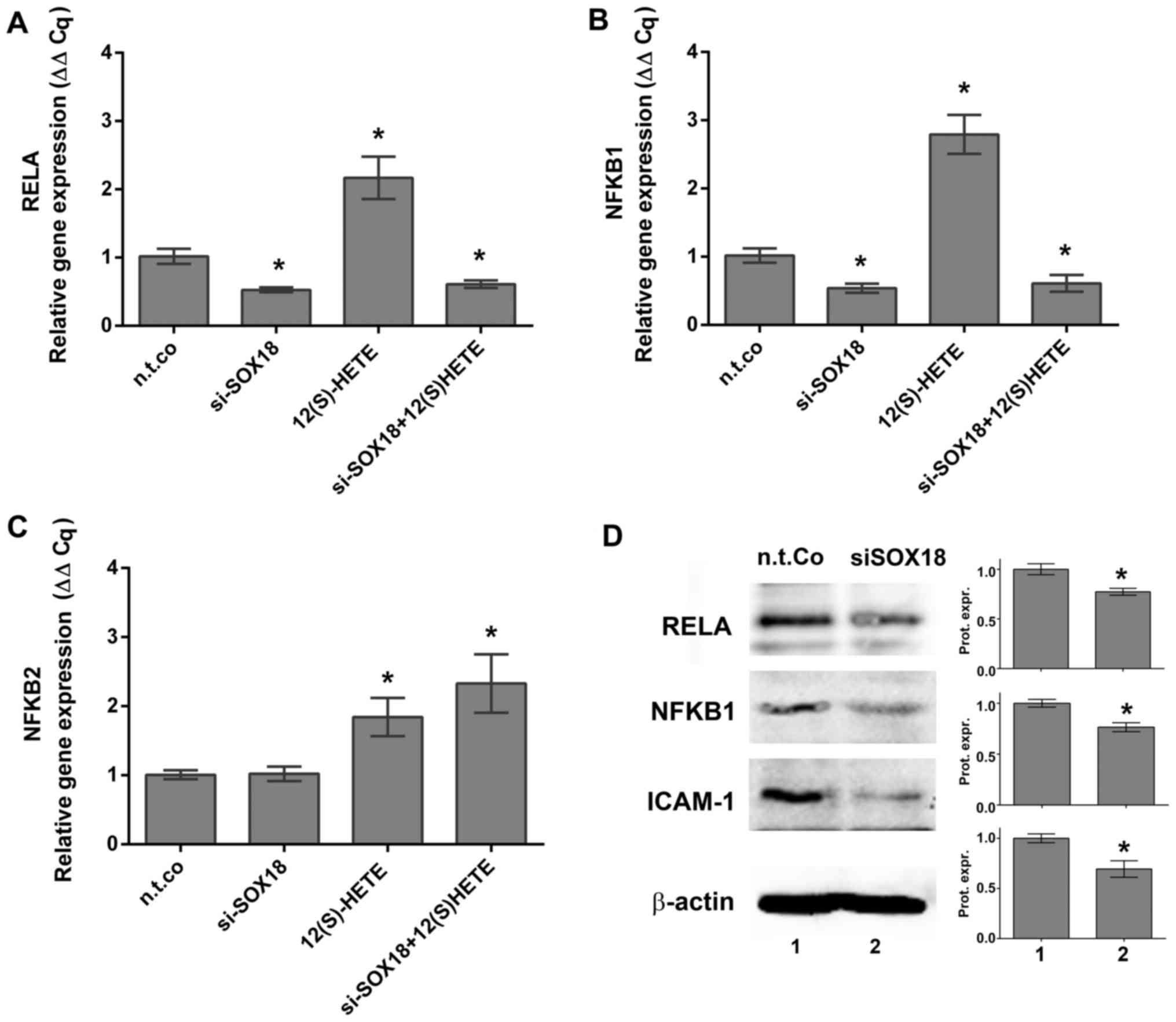|
1
|
Brabletz T, Kalluri R, Nieto MA and
Weinberg RA: EMT in cancer. Nat Rev Cancer. 18:128–134. 2018.
View Article : Google Scholar : PubMed/NCBI
|
|
2
|
van Zijl F, Krupitza G and Mikulits W:
Initial steps of metastasis: Cell invasion and endothelial
transmigration. Mutat Res. 728:23–34. 2011. View Article : Google Scholar : PubMed/NCBI
|
|
3
|
Schoppmann SF, Bayer G, Aumayr K, Taucher
S, Geleff S, Rudas M, Kubista E, Hausmaninger H, Samonigg H, Gnant
M, et al Austrian Breast and Colorectal Cancer Study Group:
Prognostic value of lymphangiogenesis and lymphovascular invasion
in invasive breast cancer. Ann Surg. 240:306–312. 2004. View Article : Google Scholar : PubMed/NCBI
|
|
4
|
Kerjaschki D, Bago-Horvath Z, Rudas M,
Sexl V, Schneckenleithner C, Wolbank S, Bartel G, Krieger S, Kalt
R, Hantusch B, et al: Lipoxygenase mediates invasion of
intrametastatic lymphatic vessels and propagates lymph node
metastasis of human mammary carcinoma xenografts in mouse. J Clin
Invest. 121:2000–2012. 2011. View
Article : Google Scholar : PubMed/NCBI
|
|
5
|
Sobin LH, Gospodarowicz MK and Wittekind
C: TNM Classification of Malignant Tumours (Uicc International
Union Against Cancer). 7th edition. Wiley-Blackwell; New York, NY:
2009
|
|
6
|
Kanki Y, Nakaki R, Shimamura T, Matsunaga
T, Yamamizu K, Katayama S, Suehiro JI, Osawa T, Aburatani H, Kodama
T, et al: Dynamically and epigenetically coordinated GATA/ETS/SOX
transcription factor expression is indispensable for endothelial
cell differentiation. Nucleic Acids Res. 45:4344–4358. 2017.
View Article : Google Scholar : PubMed/NCBI
|
|
7
|
Wigle JT and Oliver G: Prox1 function is
required for the development of the murine lymphatic system. Cell.
98:769–778. 1999. View Article : Google Scholar : PubMed/NCBI
|
|
8
|
Wigle JT, Harvey N, Detmar M, Lagutina I,
Grosveld G, Gunn MD, Jackson DG and Oliver G: An essential role for
Prox1 in the induction of the lymphatic endothelial cell phenotype.
EMBO J. 21:1505–1513. 2002. View Article : Google Scholar : PubMed/NCBI
|
|
9
|
François M, Caprini A, Hosking B, Orsenigo
F, Wilhelm D, Browne C, Paavonen K, Karnezis T, Shayan R, Downes M,
et al: Sox18 induces development of the lymphatic vasculature in
mice. Nature. 456:643–647. 2008. View Article : Google Scholar : PubMed/NCBI
|
|
10
|
Alitalo K: The lymphatic vasculature in
disease. Nat Med. 17:1371–1380. 2011. View
Article : Google Scholar : PubMed/NCBI
|
|
11
|
Srinivasan RS, Escobedo N, Yang Y,
Interiano A, Dillard ME, Finkelstein D, Mukatira S, Gil HJ, Nurmi
H, Alitalo K, et al: The Prox1-Vegfr3 feedback loop maintains the
identity and the number of lymphatic endothelial cell progenitors.
Genes Dev. 28:2175–2187. 2014. View Article : Google Scholar : PubMed/NCBI
|
|
12
|
Yin H, Sheng Z, Zhang X, Du Y, Qin C, Liu
H, Dun Y, Wang Q, Jin C, Zhao Y, et al: Overexpression of SOX18
promotes prostate cancer progression via the regulation of TCF1,
c-Myc, cyclin D1 and MMP-7. Oncol Rep. 37:1045–1051. 2017.
View Article : Google Scholar
|
|
13
|
Wang Y, Guo H, Zhang D, Yu X, Leng X, Li S
and Zhu W: Overexpression of SOX18 correlates with accelerated cell
growth and poor prognosis in human pancreatic ductal
adenocarcinoma. Biochem Biophys Res Commun. 479:510–516. 2016.
View Article : Google Scholar : PubMed/NCBI
|
|
14
|
Ornat M, Kobierzycki C, Grzegrzolka J,
Pula B, Zamirska A, Bieniek A, Szepietowski JC, Dziegiel P and
Okolow MP: SOX18 Expression in Non-melanoma Skin Cancer. Anticancer
Res. 36:2379–2383. 2016.PubMed/NCBI
|
|
15
|
Zhang J, Ma Y, Wang S, Chen F and Gu Y:
Suppression of SOX18 by siRNA inhibits cell growth and invasion of
breast cancer cells. Oncol Rep. 35:3721–3727. 2016. View Article : Google Scholar : PubMed/NCBI
|
|
16
|
Wu Z, Liu J, Wang J and Zhang F: SOX18
knockdown suppresses the proliferation and metastasis, and induces
the apoptosis of osteosarcoma cells. Mol Med Rep. 13:497–504. 2016.
View Article : Google Scholar
|
|
17
|
Jia Y, Cao B, Yang Y, Linghu E, Zhan Q, Lu
Y, Yu Y, Herman JG and Guo M: Silencing NKD2 by promoter region
hypermethylation promotes gastric cancer invasion and metastasis by
up-regulating SOX18 in human gastric cancer. Oncotarget.
6:33470–33485. 2015. View Article : Google Scholar : PubMed/NCBI
|
|
18
|
Duong T, Proulx ST, Luciani P, Leroux JC,
Detmar M, Koopman P and Francois M: Genetic ablation of SOX18
function suppresses tumor lymphangiogenesis and metastasis of
melanoma in mice. Cancer Res. 72:3105–3114. 2012. View Article : Google Scholar : PubMed/NCBI
|
|
19
|
Fontaine F, Overman J, Moustaqil M,
Mamidyala S, Salim A, Narasimhan K, Prokoph N, Robertson AAB, Lua
L, Alexandrov K, et al: Small-Molecule Inhibitors of the SOX18
Transcription Factor. Cell Chem Biol. 24:346–359. 2017. View Article : Google Scholar : PubMed/NCBI
|
|
20
|
Overman J, Fontaine F, Moustaqil M, Mittal
D, Sierecki E, Sacilotto N, Zuegg J, Robertson AA, Holmes K, Salim
AA, et al: Pharmacological targeting of the transcription factor
SOX18 delays breast cancer in mice. eLife. 6:e212212017. View Article : Google Scholar : PubMed/NCBI
|
|
21
|
Honn KV, Tang DG, Grossi I, Duniec ZM,
Timar J, Renaud C, Leithauser M, Blair I, Johnson CR, Diglio CA, et
al: Tumor cell-derived 12(S)-hydroxyeicosatetraenoic acid induces
microvascular endothelial cell retraction. Cancer Res. 54:565–574.
1994.PubMed/NCBI
|
|
22
|
Uchide K, Sakon M, Ariyoshi H, Nakamori S,
Tokunaga M and Monden M: Cancer cells cause vascular endothelial
cell (vEC) retraction via 12(S)HETE secretion; the possible role of
cancer cell derived microparticle. Ann Surg Oncol. 14:862–868.
2007. View Article : Google Scholar
|
|
23
|
Rigby DA, Ferguson DJ, Johnson LA and
Jackson DG: Neutrophils rapidly transit inflamed lymphatic vessel
endothelium via integrin-dependent proteolysis and lipoxin-induced
junctional retraction. J Leukoc Biol. 98:897–912. 2015. View Article : Google Scholar : PubMed/NCBI
|
|
24
|
Basílio J, Hoeth M, Holper-Schichl YM,
Resch U, Mayer H, Hofer-Warbinek R and de Martin R: TNFα-induced
downregulation of Sox18 in endothelial cells is dependent on NF-κB.
Biochem Biophys Res Commun. 442:221–226. 2013. View Article : Google Scholar
|
|
25
|
Gross CM, Kellner M, Wang T, Lu Q, Sun X,
Zemskov EA, Noonepalle S, Kangath A, Kumar S, Gonzalez-Garay M, et
al: LPS Induced Acute Lung Injury Involves the NF-κB-mediated
Downregulation of SOX18. Am J Respir Cell Mol Biol. Nov 8–2017.Epub
ahead of print. View Article : Google Scholar
|
|
26
|
Vonach C, Viola K, Giessrigl B, Huttary N,
Raab I, Kalt R, Krieger S, Vo TP, Madlener S, Bauer S, et al: NF-κB
mediates the 12(S)-HETE-induced endothelial to mesenchymal
transition of lymphendothelial cells during the intravasation of
breast carcinoma cells. Br J Cancer. 105:263–271. 2011. View Article : Google Scholar : PubMed/NCBI
|
|
27
|
Viola K, Kopf S, Huttary N, Vonach C,
Kretschy N, Teichmann M, Giessrigl B, Raab I, Stary S, Krieger S,
et al: Bay11-7082 inhibits the disintegration of the
lymphendothelial barrier triggered by MCF-7 breast cancer
spheroids; the role of ICAM-1 and adhesion. Br J Cancer.
108:564–569. 2013. View Article : Google Scholar :
|
|
28
|
Nguyen CH, Senfter D, Basilio J, Holzner
S, Stadler S, Krieger S, Huttary N, Milovanovic D, Viola K,
Simonitsch-Klupp I, et al: NF-κB contributes to MMP1 expression in
breast cancer spheroids causing paracrine PAR1 activation and
disintegrations in the lymph endothelial barrier in vitro.
Oncotarget. 6:39262–39275. 2015. View Article : Google Scholar : PubMed/NCBI
|
|
29
|
Schoppmann SF, Soleiman A, Kalt R, Okubo
Y, Benisch C, Nagavarapu U, Herron GS and Geleff S:
Telomerase-immortalized lymphatic and blood vessel endothelial
cells are functionally stable and retain their lineage specificity.
Microcirculation. 11:261–269. 2004. View Article : Google Scholar : PubMed/NCBI
|
|
30
|
Yang J, Chang E, Cherry AM, Bangs CD, Oei
Y, Bodnar A, Bronstein A, Chiu CP and Herron GS: Human endothelial
cell life extension by telomerase expression. J Biol Chem.
274:26141–26148. 1999. View Article : Google Scholar : PubMed/NCBI
|
|
31
|
Livak KJ and Schmittgen TD: Analysis of
relative gene expression data using real-time quantitative PCR and
the 2(-Delta Delta C(T)) method. Methods. 25:402–408. 2001.
View Article : Google Scholar
|
|
32
|
Nguyen CH, Stadler S, Brenner S, Huttary
N, Krieger S, Jäger W, Dolznig H and Krupitza G: Cancer
cell-derived 12(S)-HETE signals via 12-HETE receptor, RHO, ROCK and
MLC2 to induce lymph endothelial barrier breaching. Br J Cancer.
115:364–370. 2016. View Article : Google Scholar : PubMed/NCBI
|
|
33
|
Nguyen CH, Brenner S, Huttary N, Atanasov
AG, Dirsch VM, Chatuphonprasert W, Holzner S, Stadler S, Riha J,
Krieger S, et al: AHR/CYP1A1 interplay triggers lymphatic barrier
breaching in breast cancer spheroids by inducing 12(S)-HETE
synthesis. Hum Mol Genet. 25:5006–5016. 2016b.
|
|
34
|
Klaus M, Prokoph N, Girbig M, Wang X,
Huang YH, Srivastava Y, Hou L, Narasimhan K, Kolatkar PR, Francois
M, et al: Structure and decoy-mediated inhibition of the
SOX18/Prox1-DNA interaction. Nucleic Acids Res. 44:3922–3935. 2016.
View Article : Google Scholar : PubMed/NCBI
|
|
35
|
Brown JD, Lin CY, Duan Q, Griffin G,
Federation A, Paranal RM, Bair S, Newton G, Lichtman A, Kung A, et
al: NF-κB directs dynamic super enhancer formation in inflammation
and atherogenesis. Mol Cell. 56:219–231. 2014. View Article : Google Scholar : PubMed/NCBI
|
|
36
|
Van den Eynden GG, Vandenberghe MK, van
Dam PJ, Colpaert CG, van Dam P, Dirix LY, Vermeulen PB and Van
Marck EA: Increased sentinel lymph node lymphangiogenesis is
associated with nonsentinel axillary lymph node involvement in
breast cancer patients with a positive sentinel node. Clin Cancer
Res. 13:5391–5397. 2007. View Article : Google Scholar : PubMed/NCBI
|
|
37
|
Chen Y, Yan J, Yuan Z, Yu S, Yang C, Wang
Z and Zheng Q: A meta-analysis of the relationship between
lymphatic microvessel density and clinicopathological parameters in
breast cancer. Bull Cancer. 100:1–10. 2013.PubMed/NCBI
|
|
38
|
Zhang S, Zhang D, Gong M, Wen L, Liao C
and Zou L: High lymphatic vessel density and presence of
lymphovascular invasion both predict poor prognosis in breast
cancer. BMC Cancer. 17:3352017. View Article : Google Scholar : PubMed/NCBI
|
|
39
|
Nguyen CH, Brenner S, Huttary N, Li Y,
Atanasov AG, Dirsch VM, Holzner S, Stadler S, Riha J, Krieger S, et
al: 12(S)-HETE increases intracellular Ca(2+) in lymph-endothelial
cells disrupting their barrier function in vitro; stabilization by
clinical drugs impairing calcium supply. Cancer Lett. 380:174–183.
2016c. View Article : Google Scholar
|
|
40
|
Brown M, Cohen J, Arun P, Chen Z and Van
Waes C: NF-kappaB in carcinoma therapy and prevention. Expert Opin
Ther Targets. 12:1109–1122. 2008. View Article : Google Scholar : PubMed/NCBI
|
|
41
|
Flister MJ, Wilber A, Hall KL, Iwata C,
Miyazono K, Nisato RE, Pepper MS, Zawieja DC and Ran S:
Inflammation induces lymphangiogenesis through up-regulation of
VEGFR-3 mediated by NF-kappaB and Prox1. Blood. 115:418–429. 2010.
View Article : Google Scholar :
|
|
42
|
Irrthum A, Devriendt K, Chitayat D,
Matthijs G, Glade C, Steijlen PM, Fryns JP, Van Steensel MA and
Vikkula M: Mutations in the transcription factor gene SOX18
underlie recessive and dominant forms of
hypotrichosis-lymphedema-telangiectasia. Am J Hum Genet.
72:1470–1478. 2003. View
Article : Google Scholar : PubMed/NCBI
|
|
43
|
Moalem S, Brouillard P, Kuypers D, Legius
E, Harvey E, Taylor G, Francois M, Vikkula M and Chitayat D:
Hypotrichosis-lymphedema-telangiectasia-renal defect associated
with a truncating mutation in the SOX18 gene. Clin Genet.
87:378–382. 2015. View Article : Google Scholar
|
|
44
|
Nguyen CH, Huttary N, Atanasov AG,
Chatuphonprasert W, Brenner S, Fristiohady A, Hong J, Stadler S,
Holzner S, Milovanovic D, et al: Fenofibrate inhibits tumour
intravasation by several independent mechanisms in a 3-dimensional
co-culture model. Int J Oncol. 50:1879–1888. 2017. View Article : Google Scholar : PubMed/NCBI
|
|
45
|
Wang G, Wei Z, Jia H, Zhao W, Yang G and
Zhao H: Knockdown of SOX18 inhibits the proliferation, migration
and invasion of hepatocellular carcinoma cells. Oncol Rep.
34:1121–1128. 2015. View Article : Google Scholar : PubMed/NCBI
|
|
46
|
Olbromski M, Grzegrzolka J,
Jankowska-Konsur A, Witkiewicz W, Podhorska-Okolow M and Dziegiel
P: MicroRNAs modulate the expression of the SOX18 transcript in
lung squamous cell carcinoma. Oncol Rep. 36:2884–2892. 2016.
View Article : Google Scholar : PubMed/NCBI
|
|
47
|
Kazenwadel J, Michael MZ and Harvey NL:
Prox1 expression is negatively regulated by miR-181 in endothelial
cells. Blood. 116:2395–2401. 2010. View Article : Google Scholar : PubMed/NCBI
|















